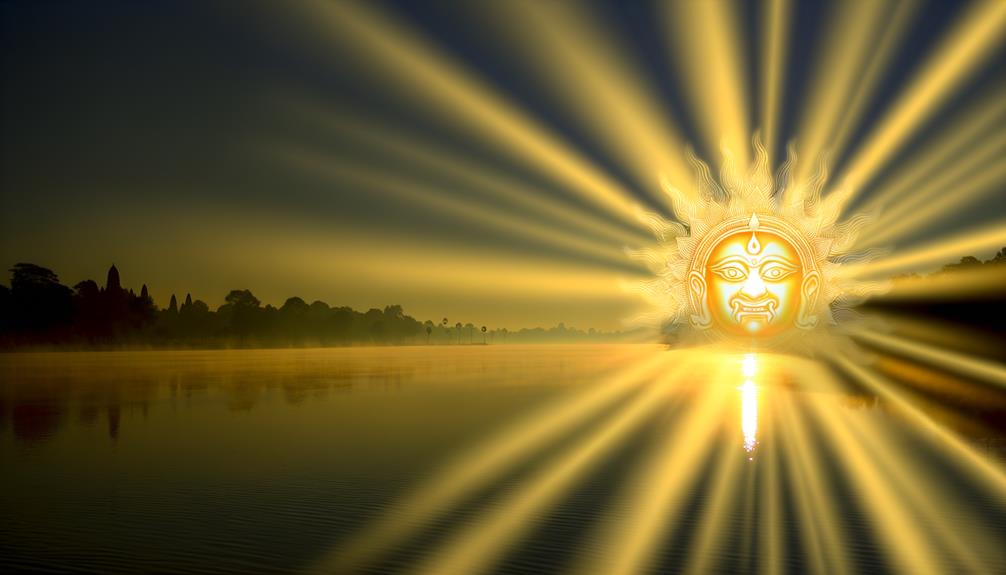Arun Name Meaning in English
The name Arun originates from Sanskrit, meaning 'dawn' or 'reddish glow.' It symbolizes new beginnings, illumination, and optimism. In Hindu mythology, Arun is the charioteer of the sun god, Surya, representing light and clarity.
The name also holds significance in Buddhist traditions, symbolizing enlightenment and wisdom. Geographical variations extend its meaning and appeal globally, with notable adaptations in India and Thailand.
Famous bearers of the name, such as Arun Jaitley and Arun Kolatkar, add to its cultural resonance. Modern interpretations of Arun highlight its blend of traditional heritage and contemporary values, apt for multicultural contexts.
For further insights into its rich symbolism and cultural impact, continue exploring.

Key Takeaways
- Arun means 'dawn' or 'reddish glow' in Sanskrit, symbolizing new beginnings and illumination.
- The name is linked to the charioteer of the sun god, Surya, representing light and clarity.
- Arun signifies enlightenment and wisdom in Buddhist traditions.
- It has cultural importance in Hindu mythology, embodying themes of new beginnings and dispelling darkness.
- Arun blends traditional heritage with modern aspirations, reflecting global interconnectedness and cultural fusion.
Etymology of Arun
The etymology of the name Arun can be traced to its roots in Sanskrit, where it signifies 'dawn' or 'reddish glow.' This linguistic origin underscores the name's connection to early morning light, symbolizing new beginnings and illumination.
In Sanskrit, the term 'aruna' is directly associated with the vivid hues of sunrise, embodying a sense of optimism and renewal. The phonetic structure of Arun is simple yet evocative, contributing to its widespread use in various cultures and languages.
Its connotations of brightness and warmth are consistent with its Sanskrit origins, making the name not only aesthetically pleasing but also rich in symbolic meaning. This etymological background offers a profound understanding of why the name Arun carries an enduring appeal.
Cultural Significance
Arun's rich etymological roots in Sanskrit not only highlight its linguistic beauty but also underscore its profound cultural significance across various traditions.
In Hindu mythology, Arun is associated with the charioteer of the sun god, Surya, symbolizing the dawn and the dispelling of darkness. This name embodies themes of light, clarity, and new beginnings, resonating deeply within Indian cultural narratives.
In addition, in Buddhist traditions, Arun signifies the emergence of enlightenment and wisdom, aligning with the broader spiritual quest for illumination.
The name's prevalence in literature, art, and daily life signifies its enduring importance, reflecting the collective cultural consciousness and values centered around hope, rebirth, and the triumph of light over darkness.
Geographical Variations
Across different regions, the name Arun exhibits unique variations and adaptations that reflect local linguistic and cultural influences. In India, Arun is a common name derived from Sanskrit, meaning "dawn" or "sun." In Thailand, Arun is associated with the famous Wat Arun temple, symbolizing the dawn. Meanwhile, in Western countries, Arun may be adapted to fit phonetic and cultural norms, often retaining its original meaning but with varied pronunciations.
| Region | Variation | Cultural Influence |
|---|---|---|
| India | Arun | Derived from Sanskrit, meaning "dawn." |
| Thailand | Arun | Associated with Wat Arun temple. |
| Western | Aaron/Aron | Phonetic adaptation, retaining meaning. |
These variations illustrate the name's broad cultural resonance, adapting to the local ethos while maintaining its core significance.
Famous Namesakes
Not only does the name Arun carry significant cultural and geographical variations, but it is also borne by numerous notable individuals across various fields.
In the domain of literature, Arun Kolatkar, an Indian poet, garnered acclaim for his bilingual prowess, penning works in both Marathi and English.
In politics, Arun Jaitley served as India's Finance Minister, leaving a lasting impact on economic policies.
The entertainment industry boasts Arun Govil, celebrated for his iconic portrayal of Lord Rama in the television series 'Ramayan.'
Additionally, the scientific community recognizes Arun Majumdar, a prominent figure in energy innovation and research.
Each of these distinguished Aruns underscores the name's prominence and diverse contributions to global intellectual and cultural heritage.
Modern Interpretations
In contemporary contexts, the name Arun is often interpreted through lenses of modernity and cultural fusion, reflecting evolving societal values and global interconnectedness. This interpretation encompasses not only its traditional meanings but also its relevance in diverse, multicultural settings. Arun has become a symbol of new beginnings and enlightenment, aligning with modern aspirations toward progress and innovation.
| Aspect | Modern Interpretation |
|---|---|
| Cultural Significance | A blend of Eastern and Western values |
| Symbolism | New beginnings, enlightenment |
| Popularity | Increasing in global communities |
The name's resonance extends beyond its Indian origins, finding favor in global communities that value cultural diversity. This adaptability signifies broader acceptance and integration, making Arun a name that bridges traditional heritage and contemporary ambition.
Conclusion
To conclude, the name Arun, rich in etymology and cultural significance, transcends geographical boundaries and epochs. From its origins in Sanskrit, symbolizing dawn or the sun, to its presence in various cultures, the name encapsulates a universal appeal. The meaning of the name Aruna is rooted in themes of light, vitality, and new beginnings, making it a name that resonates with people from all walks of life. Whether it is used in India, Indonesia, or any other part of the world, the name Aruna continues to evoke a sense of positivity and hope. As such, it is a name that truly transcends geographical boundaries and is embraced by diverse cultures worldwide.
Famous namesakes further accentuate its historical and contemporary relevance. What makes Arun's meaning so enduring across different contexts? This exploration reveals a name deeply embedded in the cultural and linguistic tapestry of human civilization.






